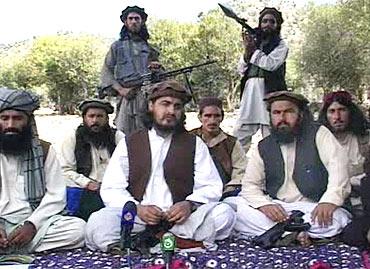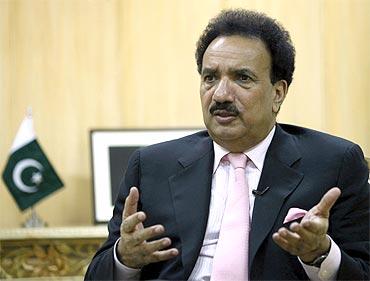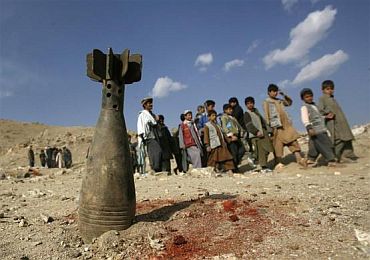 | « Back to article | Print this article |
Afghanistan, the new target of Pakistani human bombs
Following the death of top Tehrik-e-Taliban Pakistan members, a comparatively weakened Pakistani Taliban are ready to hold peace talks with a government that is increasingly seen at odds with the United States. Amir Mir reports from Islamabad.
Afghanistan seems to be the next target of the Al Qaeda linked Pakistani suicide bombers. They have apparently shifted their focus from their homeland to neighbouring Afghanistan, especially after initiating peace talks with the government in Islamabad.
A clear indication to this effect came on December 6 when Pakistan's Interior Minister Rehman Malik, in a surprising development, thanked the Taliban for maintaining peace during the Shia ritual of Ashoura and not staging terror attacks in the country. This gave credence to earlier media reports that the Tehrik-e-Taliban Pakistan (TTP) has declared a temporary ceasefire with the PPP government in Islamabad to pave way for peace talks. The anti-Shia TTP had frequently bombed Shia processions in Pakistan during Ashoura in the past.
The Pakistani authorities have already declared war on the banned Taliban movement that has frequently targeted the country's security forces and intelligence agencies' personnel. However, there have been unofficial reports in recent weeks of peace talks between the two sides, which have been refuted by both the Pakistani military and the militants. But the December 6 statement by the country's interior minister indicates that there is more to this than what meets the eye.
Talking to newsmen in Islamabad, Rehman Malik said he had appealed to the Taliban to respect the Shia observances this year and spare their processions. "And they responded positively to my appeal. This is a good sign and I am confident that the security situation will further improve in future. I am thankful to the Taliban who did not carry out any attack on Shias and showed respect to their rituals. I hope they would also remain peaceful in future, lay down arms and work together with us for the security of the country," he added.
Click NEXT to read further...
TTP set pre-requisites to initiate peace talks with govt
But it remains unclear whether Rehman Malik, who is infamous for making notorious statements on important issues of national importance in the past, was referring to a formal appeal made to the Taliban, given the fact that he himself had previously denied reports of peace talks with the Taliban.
The official line of the government is that it will only talk to the militants, including the Pakistani Taliban, if they first renounce violence and lay down their arms. Similarly, the official stance of the Pakistani military is that any negotiations or reconciliation process with the militants would be undertaken by the government and not by the military.
The only known offer of peace talks made by Rehman Malik to the Taliban on the eve of Eidul Azha (November 6) was rejected by the TTP chief Hakeemullah Mehsud (on November 7), by vowing to carry out more terrorist attacks on the state of Pakistan. The offer was made in accordance with a resolution adopted at an all-party conference (on October 18) in Islamabad which had endorsed peace talks with the Taliban.
But well informed circles in the ministry of interior claim that the TTP had actually set some pre-requisites to initiate peace talks with the government, most of which have been accepted in the aftermath of the November 26 NATO air attack on two Pakistani check posts on the Pak-Afghan border, killing 25 soldiers.
Pakistan reacted sharply to the deadly NATO strike by announcing a review of the Pak-US ties, suspending the NATO supply lines through from Pakistan to Afghanistan and giving a 15-day deadline to the Americans to vacate the Shamsi Air Base in Balochistan.
All the three Pakistani actions correspond closely with the November 19 pre-conditions made public by a TTP spokesman for entering into peace negotiations with the federal government. Therefore, unlike in neighboring Afghanistan where a suicide bomber killed more than 50 Shia worshipers on December 6, the Ashoura observances passed peacefully in Pakistan and without any terrorist activity, making the interior minister to publicly thank the Taliban for responding to his appeal and maintaining peace during the Shia ritual of Ashoura.
Click NEXT to read further...
Afghanistan has seen a sharp increase in suicide bombings
The government circles in Islamabad say following the deaths of TTP founder Baitullah Mehsud and the chief of the group's suicide bombing squad, Qari Hussain Mehsud, the Pakistani Taliban are comparatively weakened and are ready to hold peace talks with a government that is increasingly seen at odds with the United States ever since the May 2 Abbottabad operation.
Therefore, the rhythm of suicide attacks has changed dramatically in Pakistan, which has not experienced any major suicide attack September 15, when a suicide bomber killed 46 people at a funeral in the Lower Dir district of the Khyber Pakhtunkhawa Province. On the other hand, Afghanistan has seen a sharp increase in suicide bombings in recent months, the latest being the December 6 attack, targeting Shia worshippers at a Kabul mosque, killing 56 people. The attack took place on the concluding day of the Bonn conference on Afghanistan which Pakistan had boycotted.
It was the first major anti-Shia attack in Afghanistan since the fall of the Afghan Taliban a decade ago, the responsibility for which has already been claimed by none other than a Pakistan-based sectarian-cum-terrorist organisation – the Lashkar-e-Jhangvi al Almi - an offshoot of the Lashkar-e-Jhangvi, an anti-Shia sectarian-cum-jehadi group founded in 1996.
A spokesman for LeJ (Almi) claimed the Kabul attack in a phone call to Radio Mashaal, a Pashto language radio station in Afghanistan. Lashkar-e-Jhangvi al Almi is reportedly based in Pakistan's tribal areas on the Pak-Afghan border and is considered an even more radical offshoot of the LeJ. Both groups act as surrogates for Al Qaeda. In fact, the TTP has its roots in anti-Shia violence, with LeJ acting as the training ground for many of its anti-Shia leaders including Hakimullah Mehsud and his first cousin Qari Hussain Mehsud.
According to the interior ministry circles in Islamabad, the LeJ consists of eight loosely coordinated cells spread across Pakistan with independent chiefs for each cell.
Headed by a fugitive Punjabi Taliban leader, Maulana Abdul Khalil, who comes from the central Punjab, Lashkar-e-Jhangvi al-Aalmi is largely believed to be the international wing of the LeJ that operates mostly in central parts of Punjab and the tribal areas on the Pak-Afghan border.
But many terrorism experts believe that there is hardly any difference between the Lashkar-e-Jhangvi Al-Aalmi and the Lashkar-e-Jhangvi, which used to maintain military training camps in Afghanistan under the Taliban regime led by Mullah Mohammad Omar.
Check out other top slide shows
 | 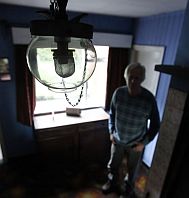 |  |
| A second earth in our galaxy | 29 years without electricity | World's costliest car crash |
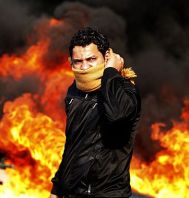 | 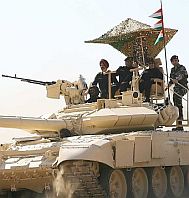 |  |
| PHOTOS of the YEAR - I | Pratibha Patil rides the T-90 | The NEW Iraq |
